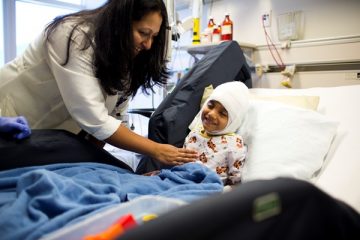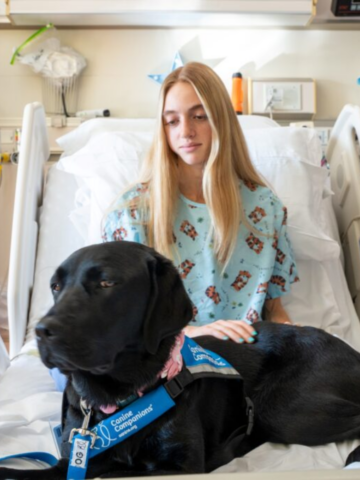
In honor of National Patient Safety Awareness Week—United for Patient Safety— (March 12-18, 2017), CHOC Children’s is joining forces with children’s hospitals across North America to affirm the critical role patients’ families play in making hospital stays as safe as possible for their children. CHOC is part of a national learning network, Children’s Hospitals’ Solutions for Patient Safety (SPS), which is made up of more than 100 children’s hospitals driven by the shared goal to urgently reduce and eliminate serious harm.
The hospitals in the SPS network have developed evidence-based bundles in care delivery for pediatric hospital-acquired conditions. The network is working with hospitals to spread and implement these bundles in order to accelerate the pace of harm reduction.
“In addition to the steps our hospital is taking to provide the safest possible care for children, there are things that families and patients can do to be part of these efforts. Families play an important role in preventing harm, and informed families can help reduce the risk of preventable harm. We are encouraging our patients and their families to follow some simple, yet potentially life-saving tips during National Patient Safety Awareness Week— and every day— that they visit a children’s hospital,” said Dr. James Cappon, chief quality and patient safety officer, CHOC Children’s.
Safety tips for families:
- Be a patient advocate for your child. Don’t be shy. Ask questions about your child’s care, raise safety concerns you have, or ask the caregiver to double check your child’s chart before doing anything. Write down your questions to make sure the caregiver addresses them. You might say, “Excuse me, I have a few questions before you start treatment. Would you mind answering them, please?”
- You know your child best. Share unique things about your child with caregivers that may be important for your child’s overall care (i.e. they have a fear of animals or only like to eat food cut in small pieces).
- Wash your hands and your child’s hands when entering and leaving the hospital, your child’s room, the bathroom, and any treatment rooms, and be sure to wash if you have handled any soiled material.
- Since you are part of your child’s health care team, do not be afraid to remind doctors and nurses about washing their hands before working with you—even if they are wearing gloves. You might say, “Excuse me, I didn’t see you wash your hands. I’d like to be sure everyone’s hands are clean. Please wash them before caring for my child.”
- Stay clean and dry. If your child has an intravenous catheter or a wound, keep the skin around the dressing clean and dry. Be sure to let your caregiver know if it gets wet or loose.
- Watch for red or irritated skin. If you notice any new redness or irritation on your child’s skin, notify your child’s caregivers. Ask what steps can be taken to prevent harm to the skin.
- Know your child’s meds. Ask for the names of the medications your child is receiving in the hospital and how they are expected to help your child. Caregivers will check your child’s identification band before giving a medication to make certain the correct medication is being given. If you don’t see this, ask staff to double check that the medication is for your child. You might say, “Excuse me, that medication is not familiar to me. Can you please double check it against my child’s chart?”
- Be prepared when going home. When your child is ready to leave the hospital, make certain you know what medications and/or treatments your child will need once home. Ask what you should watch for that will require a call to your child’s doctor and which doctor to call if questions come up. Also ask when your child will need to follow up with a physician appointment.




